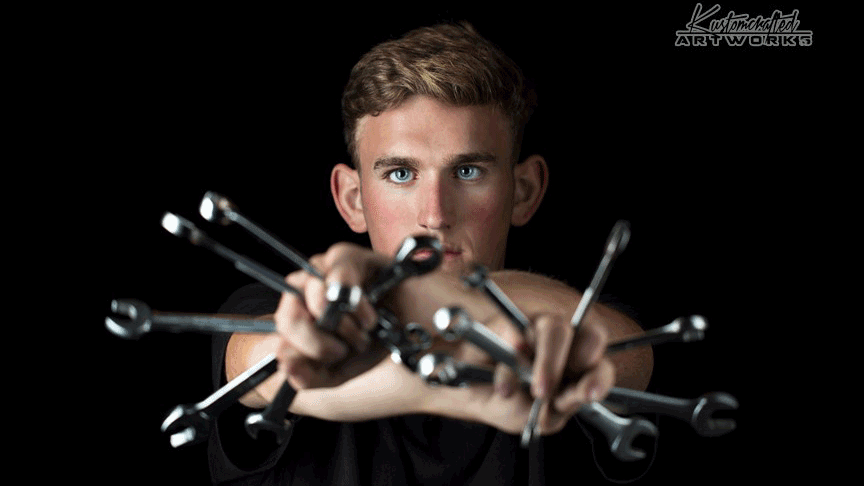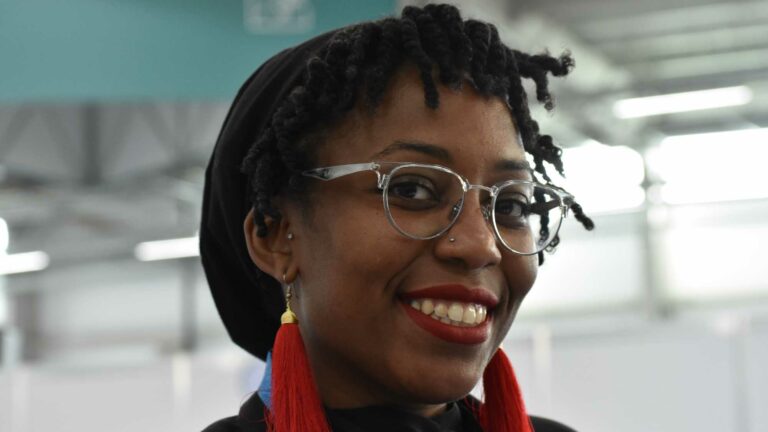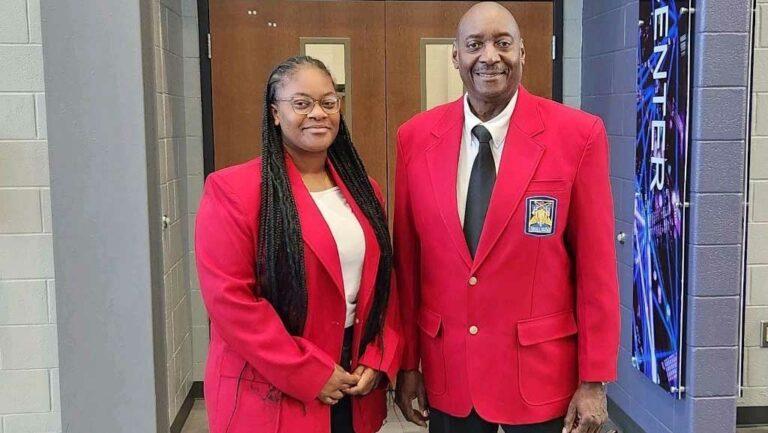Photo courtesy of Ben Falconer. Used with permission.
From a young age, Ben Falconer enjoyed all things automotive, a passion ignited while working with his father on small engines in their home garage in Greeley, Colo. At some point along the way, Falconer, now 23, remembers meeting one of his father’s friends who painted cars for a living, and his passion suddenly expanded from what’s beneath a car’s body to the body itself. This epiphany sparked a new direction that would lead to multiple SkillsUSA national gold medals and the start of an exhilarating career in vintage car restoration.
Falconer attended Greeley West High School, where his first two years were spent taking core classes with a focus on technology. During his sophomore year, he learned about a dual-enrollment program at nearby Aims Community College, where he could learn to paint cars. It was a trade he’d come to view as an art. “I learned that paint is the thing that everybody sees on a car,” Falconer explains. “When I work on an engine, nothing looks different, but with a fresh coat of paint, everyone notices. I take pride in my workmanship. I like being appreciated and seeing what I’ve been able to accomplish.”
Opportunity Ignited
Not long after Falconer started at Aims, his instructor, Mike Hanscome, told the class about SkillsUSA. “I learned about all of the things I could get out of SkillsUSA, like jobs and learning about different career paths, and I became interested,” Falconer remembers. “Also, I didn’t do sports in high school, so it was a big deal to me to be able to find something else I could compete in.”
“Ben was an exceptional student with a great personality and a drive to be good at what he wanted to do,” says Hanscome. “He had great family backing, and he was excited about SkillsUSA from the start. In fact, when I told the class about SkillsUSA and asked if anyone wanted to compete, Ben immediately said, ‘Yes, and I’m going to win!’ Sure enough, Ben put in the time and work to get ready.”
Falconer competed in Automotive Refinishing at the district SkillsUSA competition in the fall of 2014. “It was the first time I took an overnight trip and that was exciting,” he remembers. “There were only about nine others I would be competing against, and the top three would get to go on to the state competition, so I was able to relax and enjoy it as a fun experience.”
Falconer was among those top three at competition’s end, and, the following month, he took his burgeoning skills to the state level. “That competition was totally different,” he recalls. “There were a lot more people there, maybe 25 of us. That’s when it became a challenge, and anxiety came into play.”
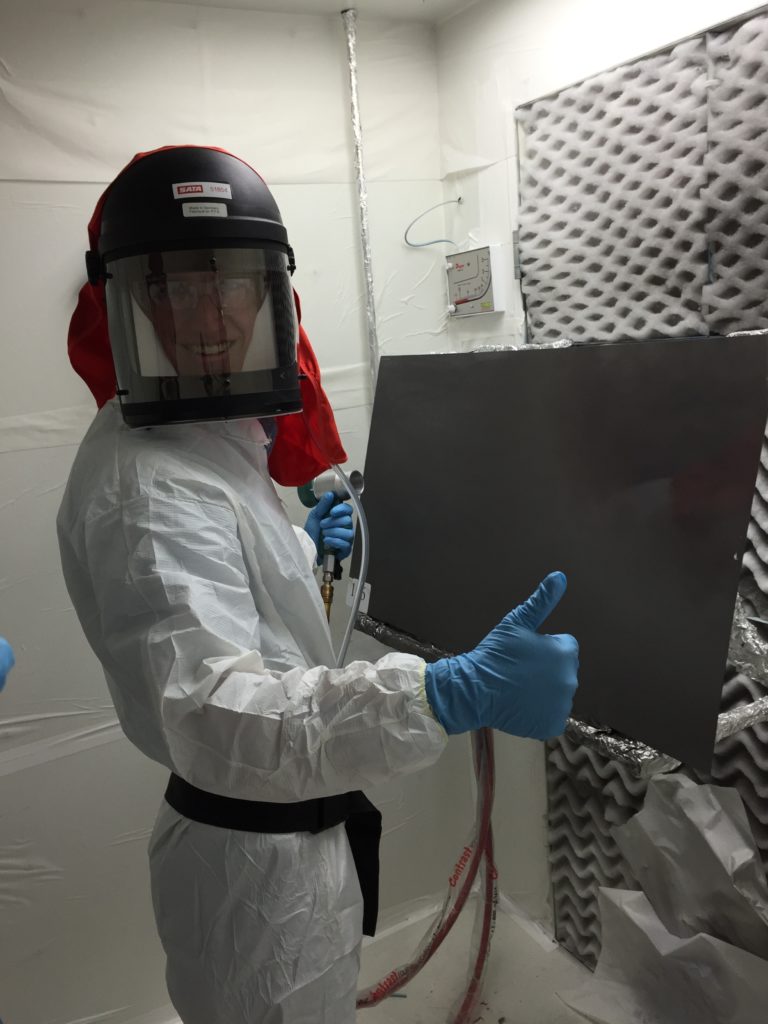
That anxiety only drove Falconer to push harder, and Hanscome remembers a story from the event that attests to the competitor’s determination, a determination that would rival that of any athlete. “Ben was sanding his fender to get it ready for painting, and it slipped and cut his hand,” Hanscome remembers. “The contest officials came and got me because Ben was turning white and did not want to stop. Ben refused to quit the competition and get stitches, so we superglued his cut, wrapped it up, put a glove on his hand, and he finished.”
Despite the mental and physical obstacles, Falconer won gold at the state level and went on to the 2015 national SkillsUSA Championships in Louisville, Ky., where he also took home gold. He repeated the feat in 2016, earning back-to-back “best in the nation” bragging rights. That said, those achievements provided Falconer with far more than an opportunity to pat himself on the back; they shaped his entire life, both personally and professionally.
Full Ride to the Future
“How did SkillsUSA help me? If I hadn’t put in the extra work to prepare myself for the competitions, I wouldn’t be where I am today,” Falconer explains. “The extra time I spent in a paint booth makes me a better painter, and the extra time I spent learning how to communicate in interviews helped me get my job. Also, the company connections I received from competing helped me get my name out there, and the tools and prizes I won at the competition helped me with my career.”
“The SkillsUSA Championships is more than a competition,” Hanscome reflects. “It is a career event where the students get to compete with other schools with industry watching them. They are under stress, and industry gets to see how they handle it. Students get to develop relationships with industry leaders and other competitors. It is an all-in-one career fair and show-and-tell.”
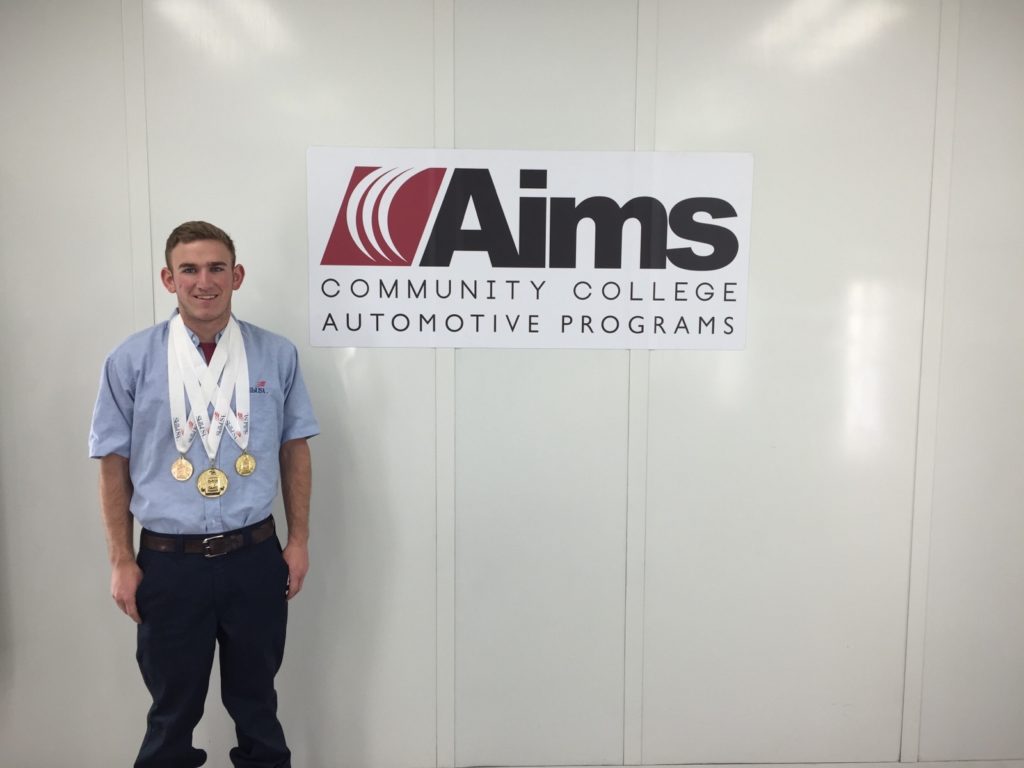
Photo courtesy of Ben Falconer. Used with permission.
As another reward for his gold medal two-peat, Falconer received several full-ride scholarship offers for two-year technical schools. His preference, however, was to go to a four-year college, and when his father suggested McPherson (Kan.) College, a school where Falconer could study automotive restoration and earn a bachelor’s degree, Falconer knew he’d found his collegiate home. “Even though I really liked automotive refinishing, I knew that I didn’t want to only paint for the rest of my career, and learning about automotive restoration sounded exciting,” Falconer says.
Once at McPherson, Falconer studied metallurgy while learning to rebuild engines, machine parts, make sheet metal panels and more. “Restoration means learning to do everything on a car,” Falconer explains. “We even did interior work. It’s a pretty awesome school for anybody that wants to do car stuff.”
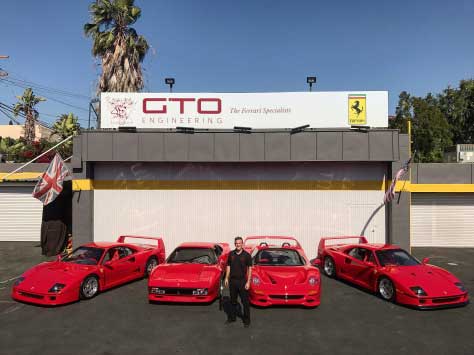
McPherson also provided opportunities for summer internships, and Falconer landed one with GTO Engineering in Los Angeles at the end of his freshman year. There, he’d learn about a car that’s renowned for the artistry of its design and the ferocity of its performance: Ferrari. Future internships took him to GTO’s facility in England followed by Motion Products in Neenah, Wis., where Falconer now works full time restoring mostly vintage Ferraris, but also other high-end cars like Maseratis, Alfa Romeos and Porsches.
“I feel school systems are designed to not let students see that going into a technical trade area is a viable option. I feel very successful in life. I’m glad I chose this path.”
Ben Falconer
At Motion, Falconer typically sets up in the paint shop, where he will be either color sanding or polishing after a car is painted. On other days, he paints components or works in the metal shop making panels and fabricating brackets. “The sheet metal part is my favorite,” he says, “because I get to be creative. I get to see it in my mind and then build it and make it work.”
“A Ferrari is like a DaVinci masterpiece,” Falconer continues, crafting an analogy that could be applied to the history of his career success. “The outside is a beautiful work of art, and underneath are years of repairs and corrections that add to the amazing story of the car.”
The SkillsUSA connection to Falconer’s success is always close at hand: He still uses the same tools he received as rewards for his two gold medals. “I could use some standard tools that Motion Products has there, but it is so nice to have your own,” he says. “Your tools form to your hand. You adapt to your own tools in a way.” SkillsUSA has been an exceptional tool for Falconer as he’s fashioned his own path to success, and he’s grateful for his time as a member. “SkillsUSA played such a huge role in the direction I took in my life. There are numerous options and endless jobs in the technical trades that students might miss out on because of the pressure put on them to get a [traditional] degree. I feel school systems are designed to not let students see that going into a technical trade area is a viable option. I feel very successful in life. I’m glad I chose this path.”


